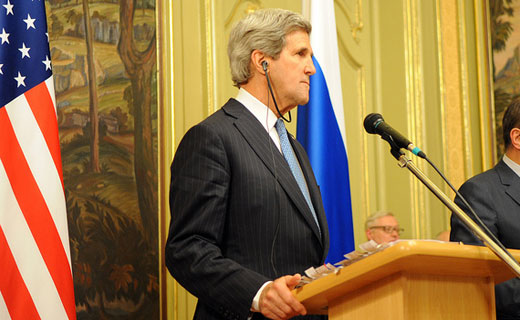
Two recent developments sharply ratcheted up pressure for direct U.S. military intervention in Syria: Israeli airstrikes hit sites near Damascus, and accusations intensified that the Assad regime has used chemical weapons. So far, it appears President Obama is resisting the pressure, but that could change if moves for a political solution to the war in Syria do not succeed.
On Tuesday in Moscow, Secretary of State John Kerry and Russian Foreign Minister Sergei Lavrov announced they will work to convene an international diplomatic conference in the coming weeks to negotiate an end to the war. They said they will seek to get representatives of Syrian President Bashar al-Assad and opposition leaders to attend. If that happens, and an agreement is reached to end the war, it would halt a two-year-old conflict that has become a magnet for sectarian extremists and threatens to engulf the entire region. If a political settlement is achieved it would also be a big foreign policy success for Obama.
But that’s a big “if.”
Last weekend, U.S. ally Israel launched two missile attacks against reported Syrian government military installations close to Damascus. The airstrikes set off huge explosions. Israeli officials portrayed the attacks as defensive, saying they targeted missiles being shipped from Iran to Hezbollah in Lebanon, to be used against Israel. Others saw the airstrikes on Syria as a lead-up to an Israeli attack on Iran.
But they could also have been intended to test Syria’s defenses and responses, serving as a stalking horse for wider military action, by the U.S. or others.
The Israeli actions were certainly used that way by U.S. warhawks like Sen. John McCain. McCain, speaking Sunday on FOXNews, said the Israeli airstrikes showed that Syria’s defenses were not that strong. “The Israelis seem to be able to penetrate it fairly easily,” he said. McCain said the U.S. could disable Syrian air defenses “with cruise missiles” and by using Patriot missile batteries to set up a “safe zone” for rebels. Michigan Republican Rep. Mike Rogers said the U.S. could enforce a no-fly zone over part of Syria without putting American pilots at risk by using “better technology” – which implies using surface-to-air missiles.
U.S. military leaders and analysts, however, said any such action would require massive U.S. military involvement.
Meanwhile, charges that the Assad regime has used chemical weapons against opponents, first raised last year, reached a new height in recent weeks, with Syrian rebels producing testimony and evidence to bolster the accusations. The chemical weapons issue has been all over the U.S. media. However the evidence is in dispute.
The White House said on April 25 it believed “with some degree of varying confidence” that the Syrian government has used chemical weapons – specifically the nerve agent sarin – against its own people. Prominent figures such as British Prime Minister David Cameron declared it is “very likely” the Syrian government has used chemical weapons. However United Nations commissioner Carla Del Ponte drew headlines last week when she said testimony from victims of the conflict in Syria suggested that rebels may have used sarin.
“This is not the first time rebel forces in Syria have come under suspicion for using chemical weapons.” said BBC correspondent Bridget Kendall. “But allegations … coming from a senior UN official is a different matter. Carla del Ponte is a former war crimes prosecutor and serves on a UN commission looking into human rights abuses in Syria. So any comments from her carry weight.”
Del Ponte is a former Swiss attorney-general and prosecutor with the International Criminal Tribunal for the former Yugoslavia. “I was a little bit stupefied by the first indications we got” from interviews with victims, doctors and others, “they were about the use of nerve gas by the opposition,” she told Swiss TV. She said government troops might also have used chemical weapons, but more investigation was needed.
UN officials later stated there was thus far “no conclusive proof” that either side in the Syria conflict had used chemical weapons.
Others say use of chemical weapons, by either side, may have been accidental.
It is all reminiscent of the “weapons of mass destruction” talk in the run-up to the 2003 U.S. invasion of Iraq. The Syria crisis probably would undoubtedly not have become so bloody and dangerous if the U.S. had not over the past year helped the reactionary Saudi Arabian and Qatari governments funnel money to Syrian rebels. The emergence of al-Qaeda-type groups in Syria happened during this period. Now, the fact that the president is exercising caution at this point is, for many, a positive change from the Bush-Cheney approach.
Photo: U.S. Secretary of State John Kerry and Russian Foreign Minister Sergei Lavrov address reporters after their meeting on Syria at the Russian Ministry of Foreign Affairs’ Guesthouse in Moscow, May 7, 2013. State Department photo












Comments